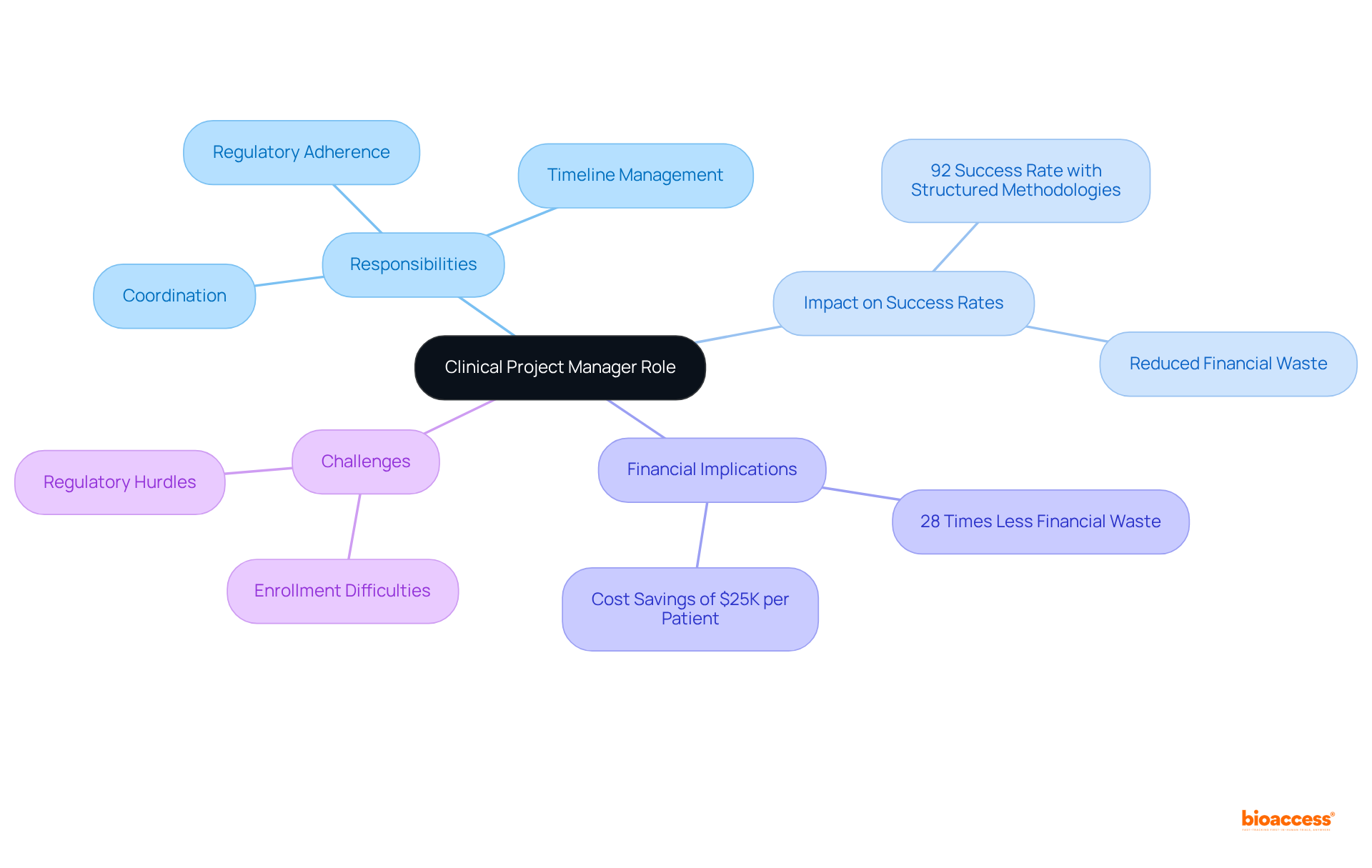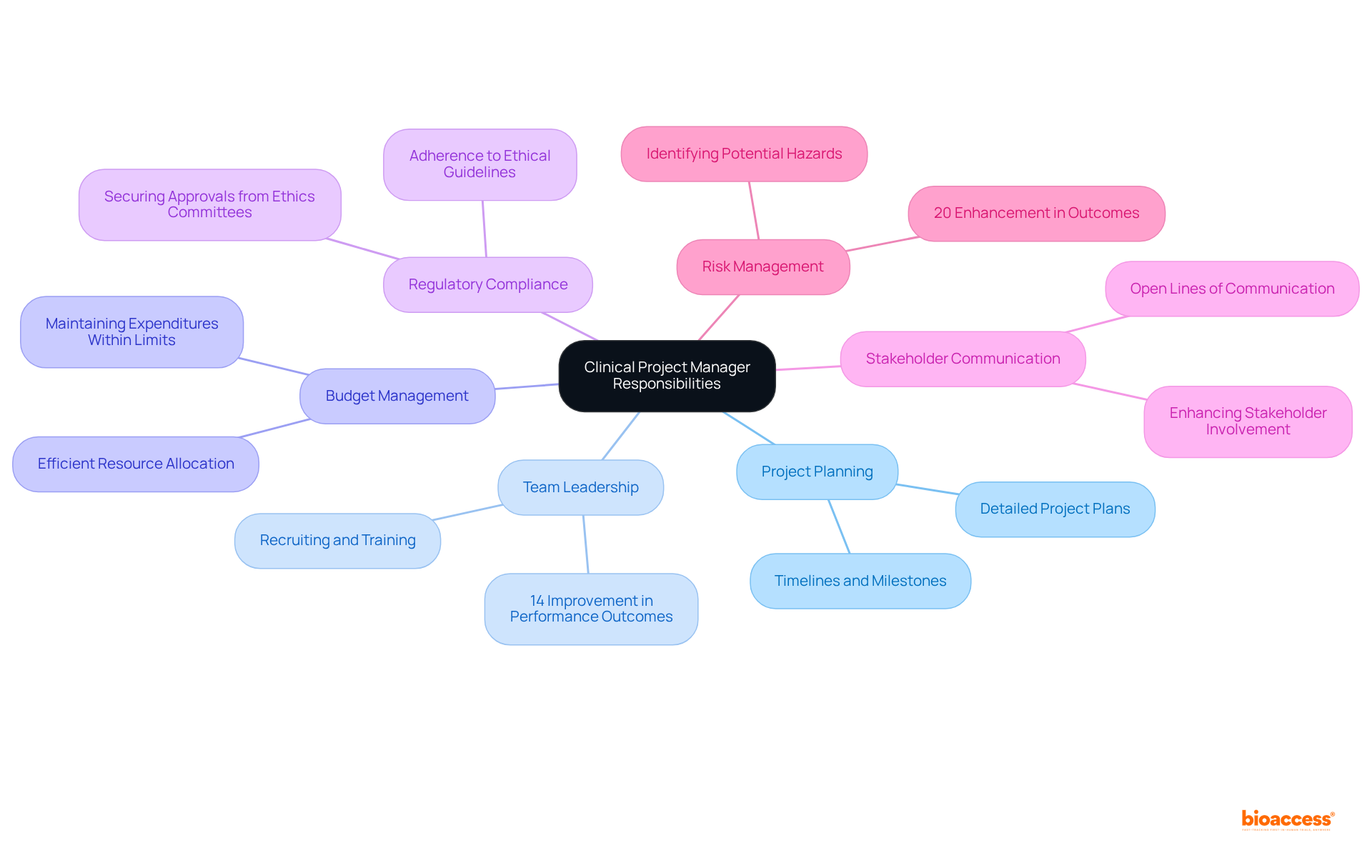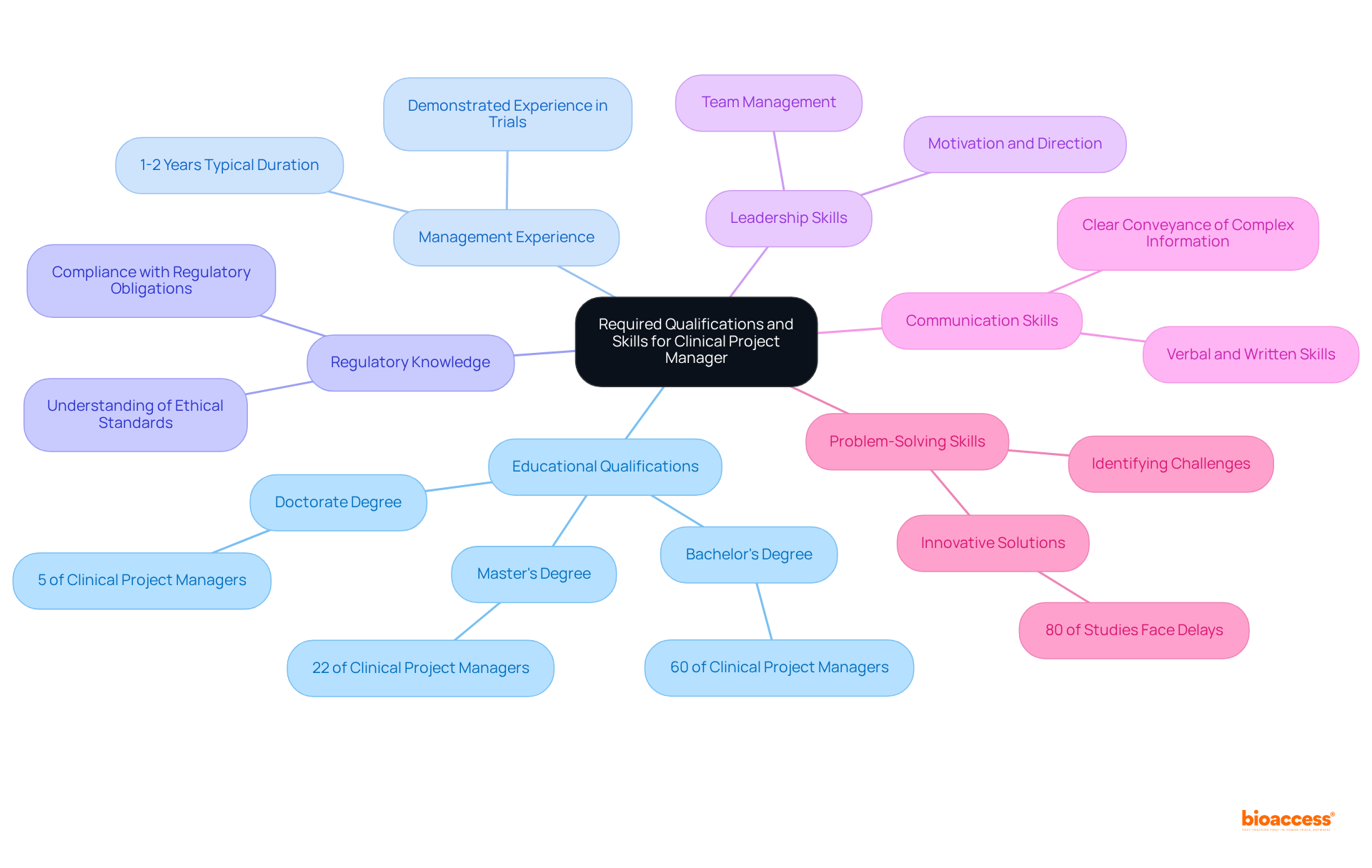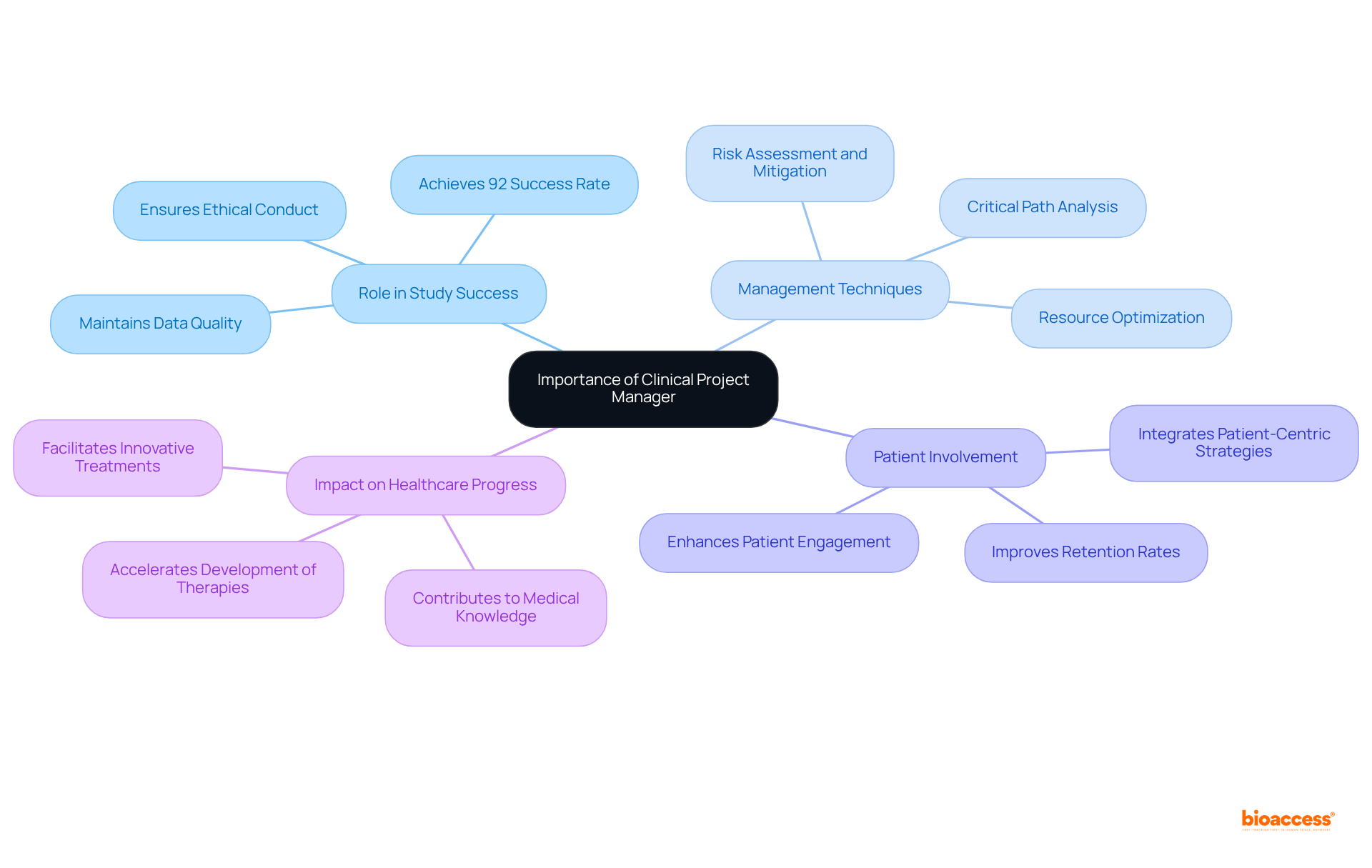


The clinical project manager is vital in overseeing clinical trials, ensuring effective planning, execution, and compliance with regulatory standards. This role significantly influences the success of medical studies. Notably, their leadership and organizational skills contribute to an impressive 92% success rate in trials.
Furthermore, their adeptness in managing resources and fostering stakeholder relationships drives advancements in medical knowledge and enhances patient outcomes. This underscores the critical nature of their contributions in the realm of clinical research.
The role of a clinical project manager often represents the unsung hero behind the success of clinical trials, orchestrating a complex symphony of planning, execution, and compliance. As the linchpin connecting sponsors, regulatory bodies, and research teams, these professionals ensure that studies adhere to rigorous standards while driving efficiency and innovation in medical research. However, with approximately 80% of studies failing to meet their objectives, the question arises: what skills and strategies are essential for clinical project managers to thrive amidst such challenges and contribute to the advancement of healthcare?
The clinical project manager plays a pivotal role in clinical studies, overseeing the planning, execution, and completion of clinical trials. This role encompasses the coordination of various project elements, including timelines, budgets, and adherence to regulatory standards. By acting as a crucial link between stakeholders—such as sponsors, regulatory bodies, and research teams—the clinical project manager ensures that all parties remain aligned and informed throughout the study.
Effective management is essential; organizations that implement structured methodologies achieve a remarkable 92% success rate in meeting their objectives. Furthermore, the involvement of skilled clinical project managers significantly influences study outcomes, with research indicating that their participation can lead to reduced financial waste and improved resource utilization. For instance, organizations employing proven methodologies experience 28 times less financial waste compared to those lacking such frameworks, highlighting the financial ramifications of effective project management.
Additionally, approximately 80% of research studies fail to meet initial enrollment objectives and timelines, underscoring the challenges faced in clinical research, including regulatory hurdles and recruitment difficulties. The clinical project manager (CPM) plays a crucial role in overcoming these challenges by utilizing bioaccess®'s accelerated patient recruitment and site activation services, which enable the enrollment of treatment-naive cardiology or neurology cohorts 50% faster than Western sites, resulting in significant cost savings of $25K per patient.
By managing these complex responsibilities, the clinical project manager plays a crucial role in advancing medical knowledge and enhancing patient outcomes, ultimately ensuring the success of research studies.

The role of a clinical project manager encompasses a diverse range of responsibilities that are crucial for the success of clinical studies. Key responsibilities include:
These responsibilities illustrate the multifaceted nature of the clinical project manager's role, which necessitates a blend of leadership, organizational, and communication skills. As Ryan Bradshaw observes, cultivating the next generation of leaders is a major challenge for numerous organizations, underscoring the significance of effective leadership in managing health-related initiatives.

To excel as a clinical project manager, candidates typically require a blend of educational qualifications and specific skills. A bachelor's degree in life sciences, nursing, or a related field is often essential. Approximately 60% of healthcare program managers hold a bachelor's degree, while 22% possess a master's degree, and 5% have a doctorate. Advanced degrees, such as a Master's or PhD in healthcare studies or management, are becoming increasingly prevalent among successful clinical project managers.
Demonstrated management experience in overseeing trials or studies is crucial, frequently necessitating several years in a relevant position. The typical duration for project managers in the healthcare sector is 1-2 years, emphasizing the importance of practical experience in this area.
A profound comprehension of regulatory obligations and ethical standards governing medical studies is essential for ensuring adherence. This knowledge fosters a culture of integrity and accuracy, which is vital in research trials.
Strong leadership abilities are necessary to effectively manage teams and encourage collaboration among diverse stakeholders. The capacity to motivate and direct groups is essential in navigating the complexities of medical investigation.
Excellent verbal and written communication skills are crucial for conveying complex information clearly and effectively to various audiences. Effective communication serves as a cornerstone of successful project management, facilitating seamless interactions among team members and stakeholders.
The ability to identify challenges and devise innovative solutions is paramount for managing the intricacies of medical research. With 80% of studies facing delays due to recruitment issues, robust problem-solving skills can significantly enhance efficiency.
These qualifications and skills collectively enhance the effectiveness of a clinical project manager in leading successful studies, ensuring that projects are completed on schedule and within budget while upholding high standards of quality and compliance.

The clinical project manager plays a pivotal role in the success of clinical studies, ensuring that trials are conducted efficiently, ethically, and in strict adherence to regulatory standards. Their leadership and organizational skills significantly influence the quality of studies, paving the way for advancements in medical knowledge and patient care.
For instance, ReGelTec's Early Feasibility Study on HYDRAFIL™ for addressing chronic low back pain in Colombia exemplifies how effective management can facilitate innovative treatments. By adeptly managing resources, timelines, and stakeholder relationships, a clinical project manager accelerates the development of new therapies and medical devices, enhances patient outcomes, and contributes to healthcare progress.
Their expertise in navigating the complexities of medical studies is essential, especially as the landscape of health research continues to evolve. Notably, research indicates that effective project management led by a clinical project manager can achieve a 92% success rate in medical studies, underscoring the CPM's crucial role in preserving data quality and ensuring adherence to ethical standards.
Furthermore, the presence of a skilled clinical project manager correlates with improved patient involvement and retention, which are vital for the success of the study. As the sector increasingly emphasizes patient-focused strategies, the role of the clinical project manager in integrating these elements into study design becomes even more critical, reinforcing their indispensable position in the research ecosystem.
Additionally, with a substantial number of research studies registered from 2016 to 2020, the importance of efficient management in this expanding field cannot be overstated. Clinical project managers utilize various management techniques, such as critical path analysis and resource optimization, to enhance efficiency while fostering a positive work environment that is essential for team morale and collaboration.
The expertise of bioaccess in managing clinical trials in Latin America, including Early-Feasibility and First-In-Human studies, further illustrates the significant impact of skilled project management on the success of clinical research initiatives.

The role of a clinical project manager is fundamental to the success of clinical trials, encompassing a wide range of responsibilities that ensure efficient and ethical research practices. Acting as the central coordinator among diverse stakeholders, clinical project managers not only streamline processes but also significantly enhance the quality of medical studies. Their expertise in project planning, team leadership, and regulatory compliance directly contributes to improved patient outcomes and the advancement of medical knowledge.
Key insights throughout the article highlight the multifaceted nature of this role, emphasizing the importance of effective communication, risk management, and budget oversight. With a proven track record of increasing success rates and reducing financial waste, clinical project managers are essential in navigating the complexities of clinical research. The statistics presented underscore the critical impact that skilled project management has on enrollment success and overall study efficiency, making a compelling case for the value of this profession.
In light of the growing demands in the healthcare research sector, the significance of clinical project managers cannot be overstated. As they continue to lead initiatives that shape the future of patient care and medical innovation, it is vital for organizations to invest in developing their skills and capabilities. Emphasizing the need for strong leadership and effective methodologies will not only enhance study outcomes but also foster a culture of excellence within the clinical research landscape. The call to action is clear: prioritize the cultivation of clinical project management talent to ensure the continued success and integrity of clinical trials.
What is the role of a clinical project manager?
The clinical project manager oversees the planning, execution, and completion of clinical trials, coordinating timelines, budgets, and adherence to regulatory standards while acting as a link between stakeholders.
Why is effective management important in clinical trials?
Effective management is essential as organizations that implement structured methodologies achieve a 92% success rate in meeting their objectives and can significantly reduce financial waste and improve resource utilization.
How does the involvement of clinical project managers impact study outcomes?
The involvement of skilled clinical project managers can lead to reduced financial waste and improved resource utilization, with organizations using proven methodologies experiencing 28 times less financial waste compared to those without such frameworks.
What challenges do clinical research studies face?
Approximately 80% of research studies fail to meet initial enrollment objectives and timelines, facing challenges such as regulatory hurdles and recruitment difficulties.
How do clinical project managers help overcome recruitment challenges?
Clinical project managers utilize services like bioaccess®'s accelerated patient recruitment and site activation, which enable faster enrollment of treatment-naive cardiology or neurology cohorts, resulting in significant cost savings.
What are the financial benefits of effective project management in clinical trials?
Effective project management can lead to cost savings of $25K per patient by enabling faster enrollment and reducing financial waste associated with clinical studies.
What is the ultimate goal of a clinical project manager in clinical trials?
The ultimate goal of a clinical project manager is to advance medical knowledge and enhance patient outcomes, ensuring the success of research studies.